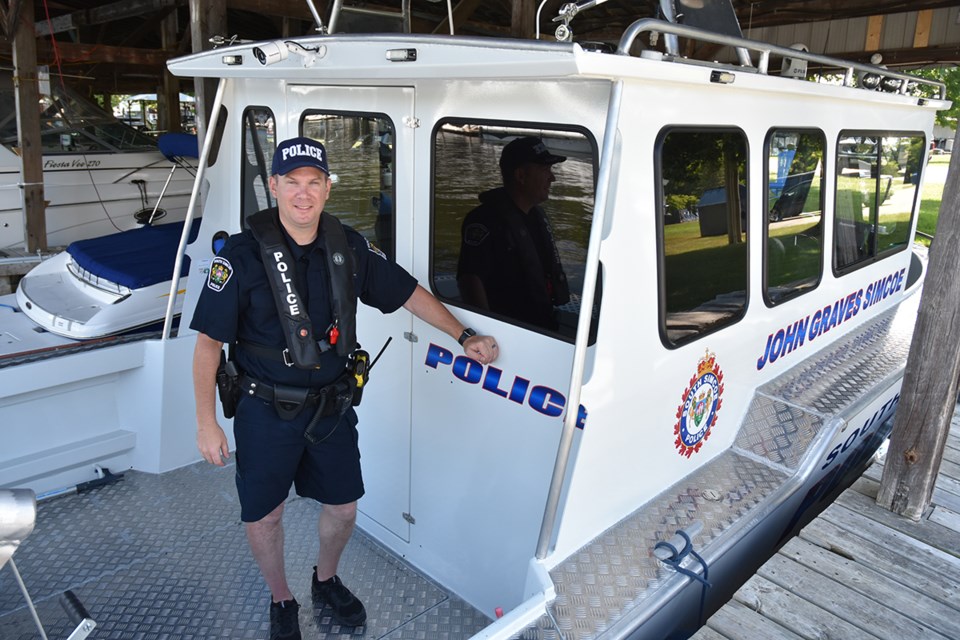This long weekend, many residents will be heading to local beaches. Some will be boating, perhaps for the first time.
Both the South Simcoe Police Service and Bradford West Gwillimbury aquatics department have the same message for boaters: Be safe.
On average, there are 166 boating-related deaths each year in Canada, according to the Canadian Red Cross.
Alcohol was “present or suspected” in more than 50 per cent of the boating fatalities, and not wearing a life-jacket figured in up to 90 per cent of all boating-related drownings.
The BWG Leisure Centre held a Boating Safety Day on June 27, as part of Recreation and Parks Month, to help get the message out.
“We’re going to tell them how to use a life-jacket, what they can and can’t do in a boat, what’s on a ‘float plan,’ what safety equipment is on a boat,” said Deck Supervisor Danielle White. “And then we’re going to send them out on the water.”
Participants, once fitted with a properly-sized life-jacket and instructed on basic safety equipment, were invited to paddle out into the deep end of the pool in an inflatable dinghy or a mini-kayak to practice falling out of a boat — and get back on board, safely.
The key is to wear a properly-fitted personal flotation device (PFD), said White. “It has to be the right size.
To determine the fit, put on the jacket, fasten it securely, then try to pull it up.
“You want to make sure it doesn’t go up above your ears.”
And never, she said, put an adult-sized life-jacket on a child: it will not provide protection. The child can simply slip from the loose jacket.
It was a message echoed by South Simcoe Police Sgt. Steve Black, of the marine unit.
“Check your life-jackets — that they’re all in working order, and that they’re the right size for the people in the boat. An adult life-jacket is no good to a child,” he said.
And although the regulations only require boaters to have proper life-jackets “readily available,” he urged all boaters to wear their personal flotation devices. In an emergency, a life-jacket tucked under a seat or in a cabin is not readily available.
“If you have to throw it to a friend, you won’t have time,” said Black.
Struggling into a life-jacket when already in the water is almost impossible, he said, especially in Lake Simcoe where year-round water temperatures are chilly enough to cause hypothermia and winds can create choppy conditions.
Every weekend, the police marine unit takes the new police boat, the John Graves Simcoe, out on Lake Simcoe, checking to ensure that vessels have all the mandated safety equipment on board, responding to calls for assistance, and checking for drinking boaters.
“If you’re planning on operating a vessel, do not drink alcohol,” said Black.
Save the drinks until the boat is anchored for the night — and even then, drinking on board a vessel is only legal if the boat has a sleeping cabin and a toilet, he said.
He reminded boaters: conviction for impaired boating will lead to a loss of driver’s licence.
“It doesn’t matter if it’s on the road or on the water. Impaired is impaired.”
Black asked boaters to ensure that their vessels are in good working order before heading out on the water, and that they have plenty of fuel, especially on a long weekend when the pumps may be closed early.
The police boat usually docks back at Lefroy Harbour by 9 p.m., but officers remain on-call to rescue boaters who have run down their battery after playing the radio all day, or who miscalculated the amount of gas they need to get back to dock.
He had other advice:
- Always file a “float plan,” letting a reliable person know the number of people on board, where you plan to go, your route, and when you plan to return.
- Carry a fully-charged cellphone.
- Make sure you have the proper documentation, including pleasure craft operator card, boat registration, and, if fishing, a fishing licence.
- Have a first-aid kit, tools, anchor and line, distress signal flares, flashlight, whistle or horn, bailing tin, and other required equipment on board.
- Wear your life-jacket, or PFD.
- Listen to the weather reports, before heading out on the water.
“Make sure you plan your weekend. Make sure you have everything on your boat,” Black said. “And be safe.”



